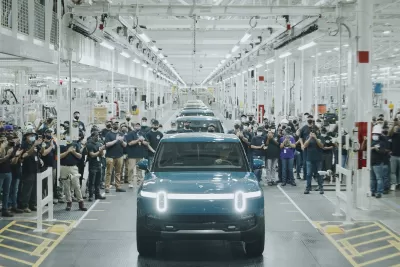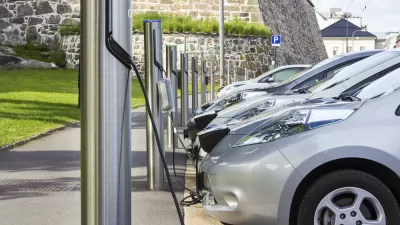Critics question the wisdom of giving Georgia's largest-ever incentive package to electric car manufacturer Rivian to secure a new factory and job training center in East Atlanta.

In what is said to be the largest incentive package ever offered by the state, Georgia has put together a massive set of tax breaks, abatements, and infrastructure improvements to lure electric vehicle manufacturer Rivian to Atlanta. Among other perks, the package includes a "mega tax credit" of $5,250 per job created and financing for a Quick Start training and recruitment facility. The facility will be built at the East Atlanta Mega Site an hour east of the city, where plans are underway to widen roads in anticipation of increased traffic to the factory.
As reported by Greg Bluestein, the package, which will be formally released in a few weeks, has drawn criticism from some who want to see more transparency in how the state secures factories and other facilities. Georgia State University professor Dan Immergluck "cautioned that Georgia is making a substantial wager, too, on a firm that is still awash in red ink and facing production glitches and fierce competition." The state's economic development commissioner, Pat Wilson, expressed optimism, noting that "the tax credits typically include a clawback mechanism that allows Georgia to seek repayment if Rivian doesn’t substantially meet its promises," which include the creation of 7,500 local jobs.
FULL STORY: Georgia’s incentive package for $5B Rivian plant likely largest-ever

Study: Maui’s Plan to Convert Vacation Rentals to Long-Term Housing Could Cause Nearly $1 Billion Economic Loss
The plan would reduce visitor accommodation by 25,% resulting in 1,900 jobs lost.

North Texas Transit Leaders Tout Benefits of TOD for Growing Region
At a summit focused on transit-oriented development, policymakers discussed how North Texas’ expanded light rail system can serve as a tool for economic growth.

Why Should We Subsidize Public Transportation?
Many public transit agencies face financial stress due to rising costs, declining fare revenue, and declining subsidies. Transit advocates must provide a strong business case for increasing public transit funding.

How to Make US Trains Faster
Changes to boarding platforms and a switch to electric trains could improve U.S. passenger rail service without the added cost of high-speed rail.

Columbia’s Revitalized ‘Loop’ Is a Hub for Local Entrepreneurs
A focus on small businesses is helping a commercial corridor in Columbia, Missouri thrive.

Invasive Insect Threatens Minnesota’s Ash Forests
The Emerald Ash Borer is a rapidly spreading invasive pest threatening Minnesota’s ash trees, and homeowners are encouraged to plant diverse replacement species, avoid moving ash firewood, and monitor for signs of infestation.
Urban Design for Planners 1: Software Tools
This six-course series explores essential urban design concepts using open source software and equips planners with the tools they need to participate fully in the urban design process.
Planning for Universal Design
Learn the tools for implementing Universal Design in planning regulations.
Ascent Environmental
Borough of Carlisle
Institute for Housing and Urban Development Studies (IHS)
City of Grandview
Harvard GSD Executive Education
Toledo-Lucas County Plan Commissions
Salt Lake City
NYU Wagner Graduate School of Public Service





























